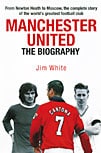 The Biography
The Biography
by Jim White
Sphere, £18.99
Reviewed by Ashely Shaw
From WSC 266 April 2009
Enter the words history and Manchester United into Amazon and the mind-boggling number of results returned suggest that this subject is perhaps over-subscribed. In the last 12 months alone there have been a plethora of retrospectives – so how can a new “biography” of United be justified?
Fortunately the author brings a fresh perspective by taking a “bottom-up” view of the material. In particular, Jim White explains a radical history running through United from its roots as a railwayman’s team, via its key role in the formation of the Players’ Union and the disputes of the early 1930s which have parallels with events of the last decade.
White also throws fresh light here and there around the more obscure corners of Old Trafford and is sufficiently removed from the club to recognise the worth of figures who are normally discredited by official histories.
Thus Tommy Docherty, regularly characterised as a chancer whose main achievement was the summary dismissal of most of the ageing European Cup winning side, is recognised for effectively saving the club from footballing disaster by restoring a basic faith in attack. The fact the Scot hadn’t sufficient friends left at boardroom level to save him from the sack was perhaps an indictment of a brusque managerial style at odds with Matt Busby’s United. Yet, ultimately, it seems the club itself were the losers, with most supporters (including one suspects the author himself) convinced that The Doc would have won at least one league title had he remained as the club’s manager.
The comparison between United’s managerial knights is also intriguing. White maintains that both Busby and Ferguson were obsessed with money – the former wouldn’t sanction “under the counter” payments to his players, despite being the best paid manager of his day, while the latter became obsessed with the green stuff as United’s share price flew through the cantilever roof during the 1990s. This particular obsession led him into an ill-fated union with the Irish Cubic Expression group, leading to the Glazer takeover that has alienated so many hardcore supporters.
White also grapples with the question of what attracts people with no affinity for Manchester to United and rightly nails the myth that the Munich tragedy itself turned the club into a global sporting institution. Rather White is right to point out that it was the club’s response to the tragedy, encapsulated by Busby telling assistant manager Jimmy Murphy to “Keep the Red Flag flying high”, that has ensured the club’s popularity over the past half century. A feat all the more remarkable when one considers that the club were largely unsuccessful during this period.
Yet as the author makes clear, it’s becoming harder to love the club’s modern day incarnation. Old Trafford has become a money-making Mecca and, with ticket prices seemingly beyond the reach of ordinary fans, those filling the stands seem more removed than ever from the railway workers whose footballing exploits kick-started the United story over 120 years ago. As the author rightly points out, the entire operation is dependent on the income generated by fans, a fact seemingly lost on successive United boards.
Let down only by occasional lapses in concentration (key goal scorers and scorelines are often confused) White has written a worthy book that ties the social as well as the football history of the club and its supporters together.